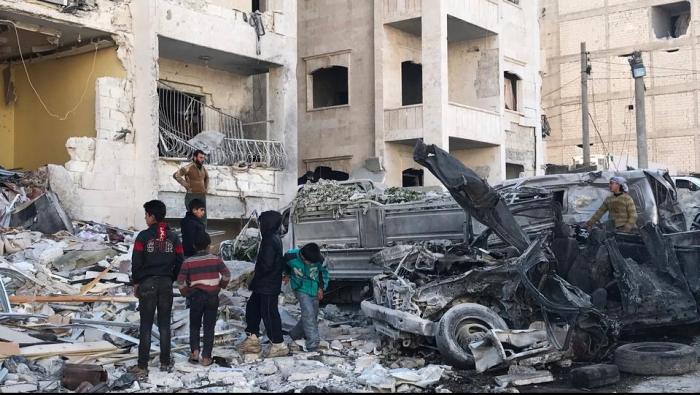Baladi News
“People in Idlib hate all those with power over them,” says Ahmad Abu Omar, 33, a history teacher living in the province, the last opposition enclave in the west of Syria.
The Independent newspaper published an exclusive interview with Abu Omar from Idlib city via Whatsapp.
He says that the three million people of Idlib fear a return of government forces, but are almost equally hostile to the armed opposition groups now ruling Idlib because they have spread violence and chaos. He sees Turkey and Russia, who this week started implementing their ceasefire agreement to prevent a government offensive into the province, as acting solely in their own interests.
Abu Omar describes the mood as war weary and disillusioned. The province south west of Aleppo was once a stronghold of the armed opposition after the original uprising of 2011. Hostility towards the government in Damascus is still intense, but so is antipathy towards its opponents. “At the beginning you could see the youth rushing to fight [against government forces],” says Abu Omar. “But now nobody cares about fighting and religious belief can no longer motivate people to fight for those in control here [the armed opposition].”
The city's residents are sceptical about the motives of local and foreign players in Idlib, but they are grateful that a new round of the fighting has been averted for the moment. They see themselves as facing a choice of evils.
Abu Ahmad Bakour, 47, who tries to eke out a living as a day labourer in Idlib, says: “We don’t understand what is happening in our region, but we are all happy that there is no fighting and no bombardment.”
He dislikes the continuing rule by opposition militias, said to number some 90,000 fighters, as much as the prospect of a return of Syrian government authority. “If we people are asked whom we would prefer to rule us, then we would say the Turkish rather than the Syrian government,” he says. Mr Bakour is fearful of the Iranian militias on the government side whom, he is convinced, would kill Sunni Arabs like himself and “put us in mass graves” if they ever recaptured Idlib.
He is trenchant in his criticism of the many opposition groups that have held Idlib city since 2015 and the rest of the province for even longer. “We are tired of war and of the militant groups that use the name of Islam to control us,” he says. “They are just stealing money and strangling the people by what they do.”
Abu Omar agrees with Mr Bakour’s rage against both the Syrian government and the armed opposition, though he does not go along with his preference for Turkish rule. He says that less than 10 per cent of people in Idlib are pro-Turkish and that the rest “realise that Turkey is playing for the region for its own benefit”.
People in Idlib are not starving, but they are very poor, particularly in the cities and towns where there is little work. In Idlib city, there are many, like Mr Bakour, who sit in the squares and roundabouts hoping to be hired as day labourers, which will earn them the equivalent of about $2 for a day's work.
Others wait beside the road selling fuel, much of which comes from the Kurdish-held oilfields in eastern Syria. Nobody is building anything so there are no construction jobs, but some skilled workers and professionals, such as doctors, nurses, electricians and car repairmen, earn good money providing essential services. The best jobs are with aid organisations that pay between $200 and $700 a month in dollars.
The Turkish-Russian ceasefire agreement in Idlib is holding, though the Syrian government speaks of it as a temporary arrangement. But it is Mr Putin and Mr Erdogan who decide what will happen in Idlib and neither of them wants the deal to collapse. Almost unnoticed, the remnants of the armed opposition, once promoted by the West and regional powers as the future rulers of Syria, is losing any autonomy it still retained and, if it has a future, it will be as auxiliaries to the Turkish army.
Meanwhile, people in Idlib distrust all sides and with good reason, but, as Abu Omar says, they “are happy with any solution that stops them again becoming the victims of displacement, destruction and war”.
Source: The Independent.

